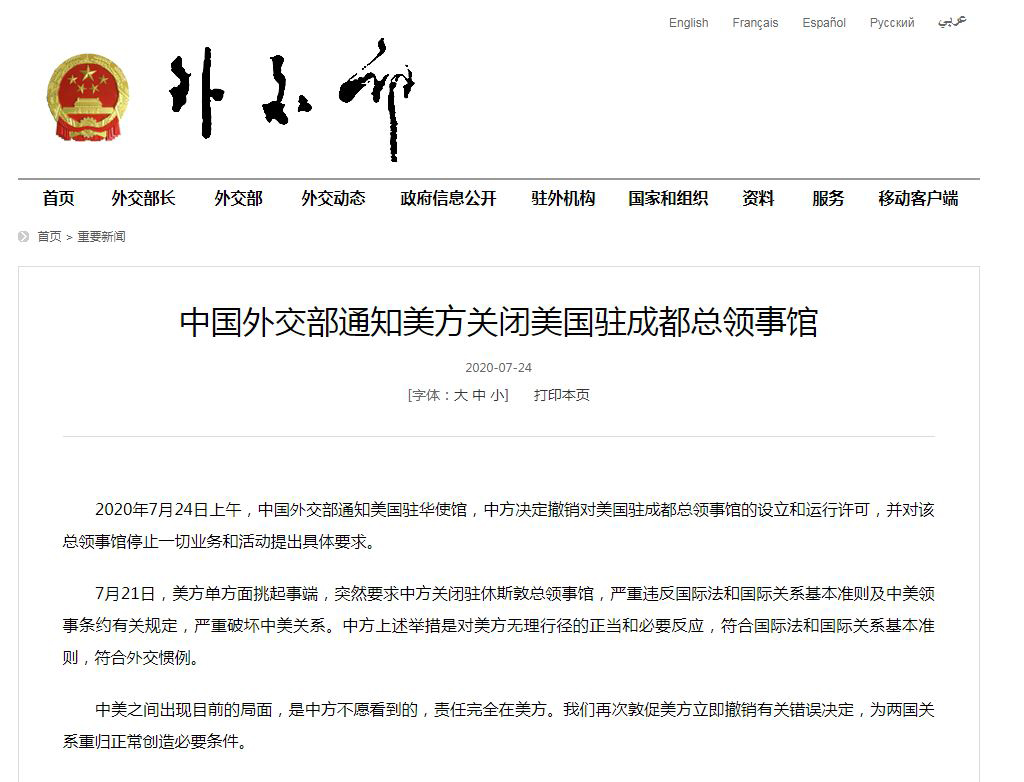Washington responsible for China's countermeasure against Houston consulate closure

BEIJING, July 24 (Xinhua) -- The Chinese Foreign Ministry on Friday informed the U.S. Embassy in China of its decision to withdraw its consent for the establishment and operation of the U.S. Consulate General in Chengdu.
The ministry also made specific requirements on the ceasing of all operations and events by the Consulate General, said a statement issued by the ministry.
The measure is a legitimate and necessary response to Washington's unjustified, abrupt and unilateral demand for Beijing to close China's Consulate General in Houston, a U.S.-style bullying and provocation that must be held accountable for the current tensions in bilateral ties.
The responsibility lies entirely with the United States, which has seriously breached international law and the basic norms governing international relations, as well as the bilateral consular agreement, and deliberately undermined bilateral relations by launching another political provocation against China.
The U.S. side claimed that it professed to "protect American intellectual property and American's private information" by closing China's Consulate General in Houston, but has failed to offer any concrete evidence to support its ravings.
Ironically, despite U.S. notoriously poor track record of respecting other nations' sovereignty, U.S. State Department spokeswoman Morgan Ortagus claimed that under the Vienna Convention, states should "have a duty not to interfere in the internal affairs" of the receiving state.
No wonder global media outlets, including the U.S. ones, have raised questiones about ulterior motives for the U.S. provocative act. Quoting U.S. Senator Angus King, a member of the Senate Intelligence Committee, CNN reported that King was not aware of any "recent intelligence of particular Chinese activities, either with regard to our elections, or the whole confrontation between our two countries ... that may have driven the decision."
The responsibility lies entirely with the United States, also because some U.S. politicians have reached the point of hysteria in damaging U.S.-China relations in recent years.
For the past few months, some senior White House officials have been stigmatizing China by politicizing the COVID-19 pandemic. The U.S. side has also used its state apparatus to suppress Chinese companies on fabricated charges.
Washington has also targeted in a frenzy Chinese nationals within its border. Apart from its political crackdown on Chinese media outlets in the United States, the U.S. side has also targeted some Chinese students in America by threatening, interrogating, confiscating personal electronic equipment and even detaining them for no reason.
According to Chinese Foreign Ministry spokesperson Wang Wenbin, the U.S. side, well before this recent political provocation, has also imposed unwarranted restrictions on Chinese diplomats, and even searched diplomatic bags without permission and seized official articles.
The unilateral closure of China's Consulate General in Houston is an unprecedented escalation by the United States against China, and China has no choice but to counter it.
There are two motivations behind Washington's anti-China campaign. One is that by lashing out at China amid the ravaging COVID-19 pandemic, some U.S. politicians, who have long been criticized for disastrous handling of the pandemic crisis and the mounting racial tensions in the country, are scrambling to shift the blame and smear China.
It also showcased some U.S. politicians' desperation to improve the falling poll ratings in the election year by stigmatizing China and politicizing bilateral ties.
By initiating and escalating provocation against China, some U.S. politicians are endangering not only one of the most important bilateral relations in the world, but also the rules-based international order.
History has shown that a constructive China-U.S. relationship is a win-win for both sides, and neither can afford the costs of full-blown confrontation. The onus is now on the U.S. side to prevent bilateral ties from further deteriorating.